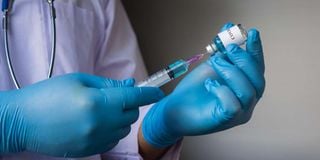Premium
Africa urged to accept vaccines if virus war is to be won

AstraZeneca expects to sell the AZD1222 vaccine at cost at about Sh327 ($3) a dose.
Hesitancy in accepting available Covid-19 vaccines by some African countries is likely to erode all the gains in public health, an expert has said.
In Africa, only two countries (Kenya and South Africa) are participating in Covid-19 vaccine trials, which are likely to take time before the final product is put to use.
Prof Omu Anzala, in the Department of Medical Microbiology at the University of Nairobi urged the East African countries to form a consortium, purchase the available vaccines that have shown efficacy and test it in their own population.
“When countries bring resources together, they are likely to bargain for more doses at a cheaper cost for their larger population,” he said. He has urged the countries to participate in the ongoing vaccine trials.
“Countries need to come together and get involved in the vaccine trials process for the benefit of their own population. Have local interventions, ensure research and discoveries are done so that one is able to understand if the vaccine is working in our own population. And also see whether the strains will concur with the vaccines that are currently being developed,” Prof Anzala said.
He challenged African countries to allocate more funds to procure the two vaccines, adding that other countries in Europe have already bought billions of doses, something that is not happening in Africa.
He said, unless the African countries develop their own vaccine from their own population from the potential vaccine candidates, they will have to allocate more funds for a standard cold chain for the vaccines. He added that the distribution and administration of the vaccine could be a challenge to African countries.
“Apart from the challenge of funding to procure the doses, there is need for countries in the continent to start prioritising the cold chain. The current vaccines in the pipeline need a cold chain of -80 degrees, this is not in many facilities in the country,” he said
As researchers race with time to develop a Covid-19 vaccine, high income countries with manufacturing capacity are already in a shopping spree, leaving the low income countries with no avenue to secure the doses.
A new global assessment of purchasing agreements for Covid-19 vaccines released on Friday revealed that that high-income countries, as well as a few middle-income counterparts have already purchased nearly 3.4 billion doses, with options for another five billion while dealing directly with the manufacturers.
“These direct deals made by high-income (and some middle-income) countries result in a smaller piece of the pie available for equitable global allocation. This pattern results in a majority of vaccines going to high-income countries and fewer doses available for low- and middle-income countries,” says the survey.
The analysis by the Duke Global Health Innovation Centre, shows that many of these countries will be able to vaccinate their entire populations and some many times over before billions of people are vaccinated in low-income countries.
The potential inequalities in vaccine access could delay access to Covid-19 protection across large regions including sub-Saharan Africa until almost the middle of the decade.
“Countries are hedging bets by making direct deals while also participating in multilateral platforms, which drives inequality and threatens to prolong a global pandemic,” said Elina Urli Hodges, who leads the Center’s Launch an initiative that identifies impediments to delivering health innovations to low-income countries.
He continues: “While it will likely take three to four years to manufacture enough vaccines to cover the world’s population, nearly four billion doses of Covid-19 vaccine candidates are already part of bilateral advance purchasing deals involving mainly high-income countries, vaccine developers and global vaccine manufacturers.
High-income countries currently hold a confirmed 3.4 billion doses, upper middle-income countries hold 694 million doses, and lower middle-income countries hold more than 1.7 billion doses.
“We have not been able to find evidence of any direct deals made by low-income countries, suggesting that low-income countries will be entirely reliant on the 20 per cent population coverage from COVAX,” says Hodges.
Prof Anzala said that there is a need for serious dialogue with all health care professionals, communities, opinion leaders, policy makers on vaccine hesitancy and the danger that has in the population.
Already, health care workers in Uganda have refused to take part in a vaccine trail that is yet to be launched in the population.
Kenyan government, on the other hand, insists on not rushing to purchase any foreign vaccine at least until their efficacy is certain.
“I understand the urge that many have to secure this vaccine as soon as possible and I share it. However, as the CS for Health, my responsibility is not just to enable access to a vaccine or vaccines, but to ensure that we make the best possible choices on them and that our decisions are irrefutably supported by Science. We are being methodical but are moving with speed,” said Mutahi Kagwe, Health Cabinet Secretary.
Mr Kagwe said that scientists at Kemri are collaborating on local vaccine trials, to ensure that the country has sufficient data on the safety and efficacy of the most promising vaccine candidates.
“There is quite a bit that needs to be done before we can say we are now ready, hence my caution. We need to be careful that Kenyans and people resident in Kenya get value for their investment but even more importantly, that any vaccine is safe for use,” he said.




